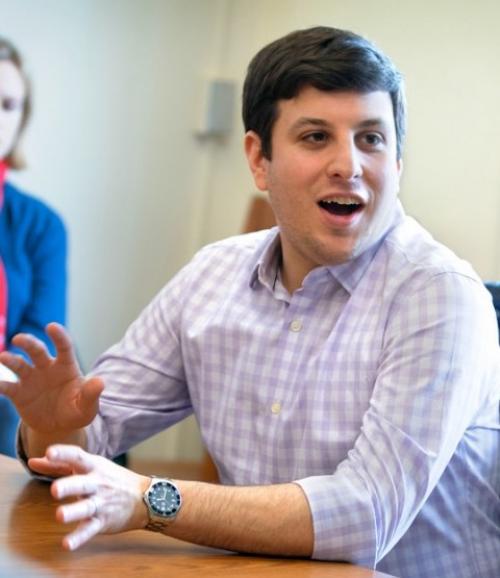When Jordan Fabian ’09 walks the halls of the White House, he always has three questions in his mind, just in case President Donald Trump happens to pass him in the hallway.
Fabian, White House correspondent for The Hill, says you never know when the president might open a door or peek into a room, and you always have to be prepared.
“With the Obama administration, the way we did our jobs was totally different,” Fabian said during a visit to campus in February. “President Obama only said things when he wanted to and only to people he wanted to talk to. President Trump will answer questions at any time. You never know what questions he might be willing to answer.”
Fabian keeps a running list of questions in his notebook. They might be on immigration reform, meetings with foreign leaders or staff shake-ups.
“I’ve been in conversations with him when he went on for 15 minutes on everything from immigration to the Russia investigation to the Super Bowl,” Fabian said. “What you see on camera is how he really is.”
Fabian, who has worked at the White House since 2015, said his days often begin with a review of the news from the night before, which might include checking the president’s Twitter feed. Then he heads to his office at The Hill to chat with editors before going to the White House.
To fully report a story, Fabian has spent lots of time developing sources, whether they are White House staffers, cabinet members or lawmakers on Capitol Hill.
“The job isn’t just showing up at the briefings, asking questions and writing stories,” he said. “There’s a lot more that goes into it to make the stories possible.”
The daily press briefings can be intense affairs, with nearly 50 reporters jockeying to get their questions answered.
“I try to break news with the questions I ask,” Fabian said of the briefings. “But I know the kinds of questions to ask in that setting. I’m not asking questions way out of left field or being argumentative for argument’s sake.”
Although he has a list of long-term stories he’d like to do, the day-to-day news and controversies of the current administration often make that difficult. Fabian said he tries not to be distracted by the president’s tweets.
“All presidents spin and misrepresent the truth, but the degree of exaggeration and the sheer number of falsehoods that are being uttered in this administration can be difficult to deal with,” he said.
Fabian graduated from Cornell with a degree in history, focusing on late-20th century American history, and wrote for the Cornell Review, WVBR and the Cornell Daily Sun. Between his junior and senior years, he landed an internship at The Hill, where he did research for other reporters as well as reported and wrote his own stories.
“I did an honors thesis here, so I had experience researching primary documents,” he said. “So many of the writing skills I was able to master here through coursework and working for the newspapers also really helped me out.”
A history buff since childhood, Fabian said Professor Barry Strauss’ classes on ancient Rome were favorites, as well as American history classes from Professor Ted Lowi, who passed away last year.
“I’m still using the lessons I learned today,” he said.
After graduation, Fabian served as political correspondent for The Hill and as political editor for Univision News’ English-language portal. He has appeared on MSNBC, Fox News and C-SPAN, and has contributed to a number of nationally-syndicated radio programs.
This story also appeared in the Cornell Chronicle.




